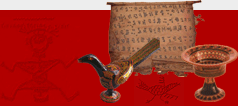|
从毕摩祭祀词汇看彝族的宗教信仰与崇拜
Looking at Religious Belief and Worship from the Perspective
of Bimo Ritual Vocabulary
普忠良 Pu Zhongliang
中国社会科学院民族学与人类学研究所
【摘要】宗教信仰是彝族社会意识形态的重要组成部分。在彝族社会历史层次上,“毕摩”是彝族宗教信仰活动的中心人物,他们既是原始宗教观念的宣传者、解释者,又是宗教仪式的主持者和组织者。“毕摩”在彝族社会享有特殊的地位和威望,毕摩在主持彝族民间的祭祀、巫术、兆卜、禁忌等信仰活动中,逐渐形成了一套比较完整又极具宗教信仰活动色彩的祭祀词汇(术语)。毕摩在祭祀活动中使用的祭祀词汇(术语)不仅承载着彝族先民的种种信仰理念,表达着彝族的宗教信俗,而且在人们的日常生活、经济生产、婚丧嫁娶等方面对彝族社会的精神生活有着极为重要的影响。本文通过对彝族祭司
“毕摩”及其祭祀词汇、术语进行综合阐释,认为彝族毕摩祭祀词汇(术语)承载着四个宗教信仰理念:“人神合一”信仰理念;“崇祖”信仰理念;“万物有灵”信仰理念;“鬼魂”信仰理念。
关键词: 彝族毕摩 宗教信仰与崇拜 祭祀词汇
Abstract
A Language is the accumulation of its history, which
preserves or reflects components of the cultural features
of the past. The multi-functions of a language show the
characters of a human society and culture (including its
religion). Language and religion both belong to the cultural
category and are closely related. Language is one of the
reflectives form of a culture, and all the forms of a culture
are reflected through its language; on the other hand, the
birth, spread and variation of a religion also have impact
on the development, change and use functions of the language,
and naturally some of traces of its religious characteristics
are preserved in the language. Religion and Belief are an
important part of the Yi social ideology. The Yi people
are distributed across a very large area, and are intermixed
with other ethnic groups, so the religion and belief of
Yi people are very complicated. The Yi people gradually
developed their own unique system of religion and belief
in which human beings and gods are closely united (they
worship their ancestors and believe in the heavenly gods)
through a long time of social life and practice. Yi people
advocate the harmony of the Yin and Yang. With the worship
of ancestors as its core, the main form of the Yi religious
belief is a united form mixing worship of nature, totems,
and all spirits. Rites, sorceries, divinations, and taboos
are the common performance of their pe33mo55 religion. And
the holder of rituals, or pe33mo55 in Yi, plays the most
important and central part in the performances, whose main
function is to bridge the distance of gods, ghosts and human
beings. They are the spiritual representatives of the traditional
belief of the primitive religion, who are the propagandists,
explainers, possessors of ritual knowledge, and even organizers
of the Yi primitive religion. And their main function is
to carry out and organize all the rituals of offering sacrifices
to gods or the spirits of ancestors and through generations
of practice they develop a complete and complex set of religious
terms and vocabulary, which not only carry the concept of
their beliefs and religious customs, but also exert an important
influence on the daily life, economic activities, marriages
and funerals and other spiritual life of the Yi society.
This paper provides comprehensive explanations for these
items of vocabulary and terms of pe33mo55 and tries to explore
the features of the Yi primitive belief and worship culture
which his often hidden in the ritual words.
Keywords: Yi people─pe33mo55(毕摩)─religious belief and
worship─respective of linguistics
作者简介:
普忠良,云南禄劝彝人,彝名普驰达岭,中国社会科学院民族学与人类学研究所《民族语文》杂志副编审,中国少数民族双语教学研究会副秘书长,《中国少数民族双语教学研究会通讯》副主编,彝族人网主编(兼)。主要从事社会语言学(文化语言学)、藏缅语言、彝族古文字及其历史和文化等方面研究,先后参加“八五”、“九五”等多项国家重点重点研究项目,并发表《西南村落双语研究》等多部专著、30篇研究论文和40多篇诗歌散文。
About the Author:
Pu Zhongliang, male, Institute of Ethnology &
Anthropology Chinese Social Science Academy , Beijing 100081.
He has buplished academic papers in many well-known journals
and books.
|





